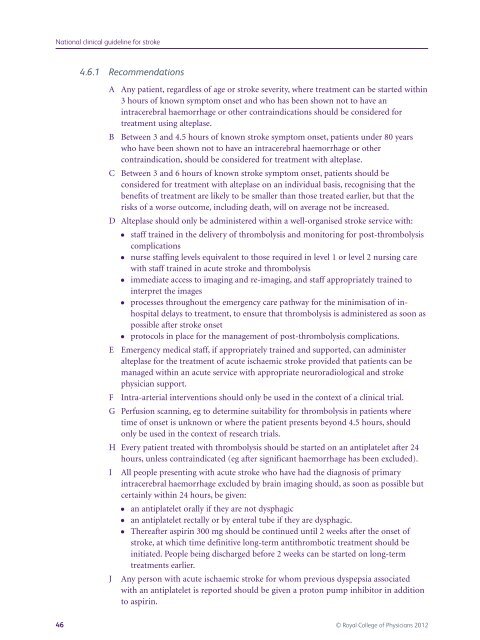national-clinical-guidelines-for-stroke-fourth-edition
national-clinical-guidelines-for-stroke-fourth-edition
national-clinical-guidelines-for-stroke-fourth-edition
Create successful ePaper yourself
Turn your PDF publications into a flip-book with our unique Google optimized e-Paper software.
National <strong>clinical</strong> guideline <strong>for</strong> <strong>stroke</strong><br />
4.6.1 Recommendations<br />
A Any patient, regardless of age or <strong>stroke</strong> severity, where treatment can be started within<br />
3 hours of known symptom onset and who has been shown not to have an<br />
intracerebral haemorrhage or other contraindications should be considered <strong>for</strong><br />
treatment using alteplase.<br />
B Between 3 and 4.5 hours of known <strong>stroke</strong> symptom onset, patients under 80 years<br />
who have been shown not to have an intracerebral haemorrhage or other<br />
contraindication, should be considered <strong>for</strong> treatment with alteplase.<br />
C Between 3 and 6 hours of known <strong>stroke</strong> symptom onset, patients should be<br />
considered <strong>for</strong> treatment with alteplase on an individual basis, recognising that the<br />
benefits of treatment are likely to be smaller than those treated earlier, but that the<br />
risks of a worse outcome, including death, will on average not be increased.<br />
D Alteplase should only be administered within a well-organised <strong>stroke</strong> service with:<br />
● staff trained in the delivery of thrombolysis and monitoring <strong>for</strong> post-thrombolysis<br />
complications<br />
● nurse staffing levels equivalent to those required in level 1 or level 2 nursing care<br />
with staff trained in acute <strong>stroke</strong> and thrombolysis<br />
● immediate access to imaging and re-imaging, and staff appropriately trained to<br />
interpret the images<br />
● processes throughout the emergency care pathway <strong>for</strong> the minimisation of inhospital<br />
delays to treatment, to ensure that thrombolysis is administered as soon as<br />
possible after <strong>stroke</strong> onset<br />
● protocols in place <strong>for</strong> the management of post-thrombolysis complications.<br />
E Emergency medical staff, if appropriately trained and supported, can administer<br />
alteplase <strong>for</strong> the treatment of acute ischaemic <strong>stroke</strong> provided that patients can be<br />
managed within an acute service with appropriate neuroradiological and <strong>stroke</strong><br />
physician support.<br />
F Intra-arterial interventions should only be used in the context of a <strong>clinical</strong> trial.<br />
G Perfusion scanning, eg to determine suitability <strong>for</strong> thrombolysis in patients where<br />
time of onset is unknown or where the patient presents beyond 4.5 hours, should<br />
only be used in the context of research trials.<br />
H Every patient treated with thrombolysis should be started on an antiplatelet after 24<br />
hours, unless contraindicated (eg after significant haemorrhage has been excluded).<br />
I All people presenting with acute <strong>stroke</strong> who have had the diagnosis of primary<br />
intracerebral haemorrhage excluded by brain imaging should, as soon as possible but<br />
certainly within 24 hours, be given:<br />
● an antiplatelet orally if they are not dysphagic<br />
● an antiplatelet rectally or by enteral tube if they are dysphagic.<br />
● Thereafter aspirin 300 mg should be continued until 2 weeks after the onset of<br />
<strong>stroke</strong>, at which time definitive long-term antithrombotic treatment should be<br />
initiated. People being discharged be<strong>for</strong>e 2 weeks can be started on long-term<br />
treatments earlier.<br />
J Any person with acute ischaemic <strong>stroke</strong> <strong>for</strong> whom previous dyspepsia associated<br />
with an antiplatelet is reported should be given a proton pump inhibitor in addition<br />
to aspirin.<br />
46 © Royal College of Physicians 2012


